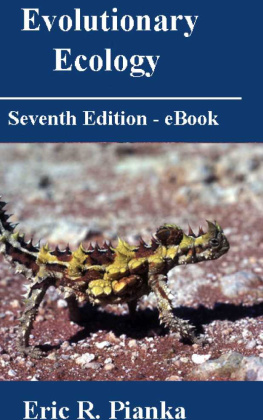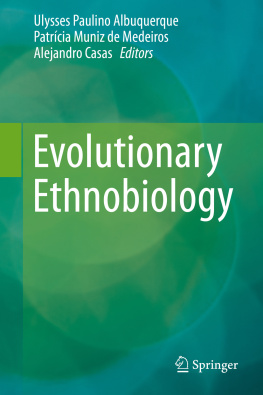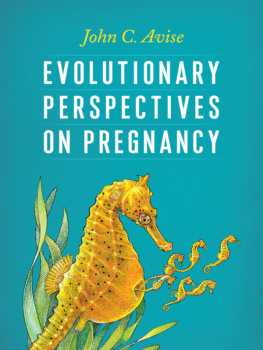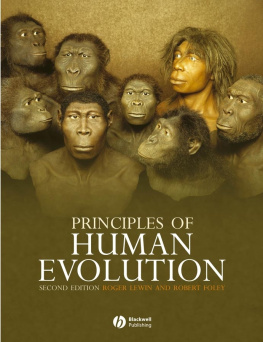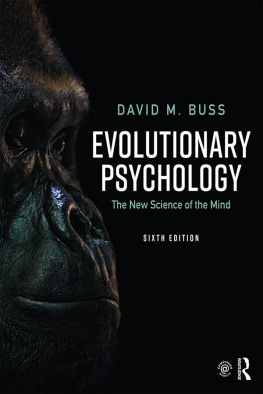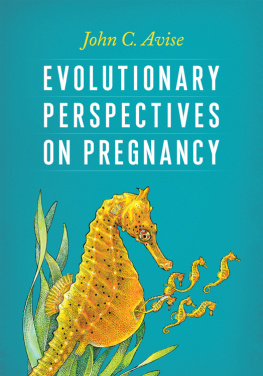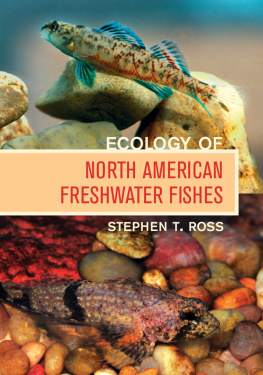Eric R. Pianka - Evolutionary Ecology
Here you can read online Eric R. Pianka - Evolutionary Ecology full text of the book (entire story) in english for free. Download pdf and epub, get meaning, cover and reviews about this ebook. year: 2011, publisher: Eric R. Pianka, genre: Romance novel. Description of the work, (preface) as well as reviews are available. Best literature library LitArk.com created for fans of good reading and offers a wide selection of genres:
Romance novel
Science fiction
Adventure
Detective
Science
History
Home and family
Prose
Art
Politics
Computer
Non-fiction
Religion
Business
Children
Humor
Choose a favorite category and find really read worthwhile books. Enjoy immersion in the world of imagination, feel the emotions of the characters or learn something new for yourself, make an fascinating discovery.
- Book:Evolutionary Ecology
- Author:
- Publisher:Eric R. Pianka
- Genre:
- Year:2011
- Rating:3 / 5
- Favourites:Add to favourites
- Your mark:
- 60
- 1
- 2
- 3
- 4
- 5
Evolutionary Ecology: summary, description and annotation
We offer to read an annotation, description, summary or preface (depends on what the author of the book "Evolutionary Ecology" wrote himself). If you haven't found the necessary information about the book — write in the comments, we will try to find it.
| This classic text presents a unique evolutionary approach to ecology. The entire text has been improved, updated, and extensively reorganized and a new chapter (16) has been added. The Sixth Edition reflects the extent to which humans now dominate ecosystems, with anthropogenic (human) effects interwoven into every chapter. |
Evolutionary Ecology — read online for free the complete book (whole text) full work
Below is the text of the book, divided by pages. System saving the place of the last page read, allows you to conveniently read the book "Evolutionary Ecology" online for free, without having to search again every time where you left off. Put a bookmark, and you can go to the page where you finished reading at any time.
Font size:
Interval:
Bookmark:

Evolutionary
Ecology
Seventh Edition - eBook
Eric R. Pianka
Text Designer and Compositor: Eric R. Pianka
Copy Editor: Eric R. Pianka
Cover: Thorny devil lizard, Eric R. Pianka
Evolutionary Ecology , Seventh Edition - eBook
Copyright 2011 by Eric R. Pianka
All rights reserved. No part of this publication may be reproduced, stored in a retrieval system, or transmitted in any form or by any means, electronic, mechanical, photocopying, recording, or any other media embodiments now known or hereafter to become known, without the prior written permission of the publisher. Manufactured in the United States of America.
Previously published in earlier editions by Harper and Row, HarperCollins, and Addison-Wesley Longman (Benjamin Cummings)
Library of Congress Cataloging-in-Publication Data
Pianka, Eric R.
Evolutionary Ecology / Eric R. Pianka. - 7th edition - eBook
Includes bibliographical references and index
1. Ecology. 2. Evolution (Biology) I. Title.
QH541. P7 2011
577dc21
For this generation,
who must confront the
shortsightedness of their ancestors
Preface
During the past five decades, evolutionary ecology has blossomed into a massive discipline that has assimilated and largely replaced other ecological subdisciplines. Until this intellectual revolution, most biologists merely accepted a broad range of biological phenomena as essentially immutable, such as the fact that sex ratios are usually near equality (1: 1), without considering why such facts might be so or how they could have evolved. Rigorous application of the theory of natural selection in population biology has greatly increased our understanding of numerous phenomena, including the evolution of such things as genetic dominance, foraging modes, reproductive tactics, senescence, sex ratios, a wide range of social behaviors, mate choice, mating systems, predator escape tactics, parasite virulence, niche breadth, resource partitioning, and so forth. The evolutionary approach has opened up whole new areas of endeavor such as optimal foraging, life history tactics, sexual selection, and coevolution, each of which became an instant subdiscipline and then quickly exploded into a field in its own right.
When I began teaching ecology over thirty years ago, only two textbooks existed both totally lacked an evolutionary perspective. In 1970, I grew tired of apologizing to my students for the inadequacies of those books and I decided to write a more modem one based on my own lectures. My approach to ecology had been strongly influenced by the work of Robert H. Mac-Arthur, an intellectual giant who held center stage in ecology until his premature death in 1972. Ecology today would be very different if Robert had not died. I like to think that my text is close to the book that Mac Arthur would have written, had he lived. Evolutionary Ecology is a Citation Classic (Current Contents , 20 June 1988) and has now been translated into Greek, Japanese, Polish, Russian, and Spanish. Several other books and even a journal have adopted the same title, and courses in evolutionary ecology are now being offered around the world.
Some ecologists favor a more mechanistic approach than I do. Some people perceive Evolutionary Ecology to be more advanced than other ecology texts, perhaps because I do not shy away from simple mathematics. I use my text in a freshman-level classes as well as in an advanced upper-division class called Evolutionary Ecology. In the freshman class I downplay the
math, but in the upper division course I emphasize that ecology is necessarily a quantitative subject, and I insist that students make an effort to understand all the math, which is really only high school algebra.
My primary goal in teaching has always been to encourage my students to think clearly. Natural selection is frequently misunderstood and naive, group selectionist explanations are often given for biological phenomena. Thinking about the evolution of various ecological attributes must be done carefully and correctly. Evolutionary Ecology is a strongly conceptual book. I have found that the best way to use my book is to adorn its concepts to students in lectures using real examples from my own personal field experience.
In previous editions, I have always tried to present evolutionary ecology as a pure science. Humans now dominate ecosystems to such an extent that pure ecology has all but vanished from the face of the earth! Hence, in this edition, multitudinous anthropogenic effects are interwoven into every chapter: these include overpopulation, many different kinds of pollution of the atmosphere, water, and land (and the manifold effects of such pollution on the health and livelihood of plants and animals, including ourselves), habitat destruction and fragmentation, endangered species, loss of genetic variability, extinction, disruption of natural ecosystems, human transportation of organisms and the resultant homogenization of earths biota, evolution of microbes that infect humans as hosts, and murder rates among humans. A new chapter has been added on the role of phylogeny and modern comparative methods in deducing the probable actual course of evolution with examples of the utility of this approach in modern ecology. Other new topics include subjects such as conservation biology, demographic stochasticity, Leslie matrices, the sunspot and time lags explanations for cyclic populations, global weather modification, experimental biogeography, evolutionary ecomorphology, the complexity-stability controversy, Jacobian matrices, evolutionary epidemiology, and Darwinian medicine.
In this edition, island biogeography is presented late in the book and it is integrated with metapopulations and conservation biology.
Language forces us to express ourselves in a one-dimensional stream of words. Nature, however, is multidimensional. This is particularly true of ecology because its subject matter includes many complexly interrelated concepts and phenomena involving several different levels of organization. There is no such thing as an ideal outline or a perfect sequential order for presentation of the subject matter treated here. To obtain an overview of modern ecology, a student needs to assimilate a great many ideas. Ideally, a reader would know everything in this book even before beginning to read it!
Perhaps the only solution is to read it twice. To assist readers in following different trains of thought than I have chosen to use, various chapters and sections are cross-referenced.
Evolutionary Ecology is my own eclectic blend and distillation of what I consider to be significant ideas and principles; they represent the residue remaining after considerable sifting and sorting through many other facts and ideas. My approach is abstract and conceptual, and I strive to provide a reasonably crisp overview of a fairly vast subject matter. This edition of Evolutionary Ecology represents an image of a part of my mind, a part that should mirror an external reality common to all living systems anywhere in the cosmos.
People have a tendency to stop citing (and quit reading) someone once he/ she dies, in favor of stroking living egos who pass judgment on grant proposals and publications. As a result, the older literature is seriously undervalued and well-meaning scientists are doomed to continually reinvent the wheel. Wherever possible, I continue to give credit to originators of concepts even though it requires citing material that some might consider dated.
Most scientific endeavors are quite pedestrian. Thus, the research projects in which most scientists engage themselves are relatively trivial, constituting mere building blocks for major advances. Such normal science is, of course, absolutely essential in that it provides the raw material for progress in understanding. Periodically an extraordinary event occurs that enables a novel breakthrough. Occasionally, this may be just a serendipitous discovery by a more or less ordinary scientist (provided, of course, that someone has the wisdom to appreciate the true significance of the discovery and the creativity to develop it). But more often than not, major new directions are charted by rare individuals with incredible intellectual prowess. Population biology has attracted a few of these people in the past, and ecology today stands poised, awaiting its next such genius.
Font size:
Interval:
Bookmark:
Similar books «Evolutionary Ecology»
Look at similar books to Evolutionary Ecology. We have selected literature similar in name and meaning in the hope of providing readers with more options to find new, interesting, not yet read works.
Discussion, reviews of the book Evolutionary Ecology and just readers' own opinions. Leave your comments, write what you think about the work, its meaning or the main characters. Specify what exactly you liked and what you didn't like, and why you think so.

